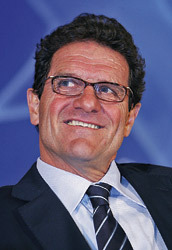 For most managers South Africa 2010 was their last World Cup involvement for four years at least. Not for Fabio Capello. The 64-year-old Italian who manages England is also an ambassador for the country’s bid to win host rights to the 2018 finals.
For most managers South Africa 2010 was their last World Cup involvement for four years at least. Not for Fabio Capello. The 64-year-old Italian who manages England is also an ambassador for the country’s bid to win host rights to the 2018 finals.
Why are you backing the England World Cup bid?
I’ve worked in three countries – Italy, Spain and England – and I think that the football here is really important. People are so passionate about the game. All the people involved in the bid – the stadiums, the facilities, the training grounds, infrastructure, everything – is top class.
Something else that is really important is security in the stadiums where the stewards’ work is crucial. Also, it helps [with security] that all the clubs own their own stadiums. In Italy all the stadiums are the property of the local authorities and in Spain not all of the stadiums are owned by the clubs, either.
Another thing is that England is a multi-ethnic country and all the countries that play here will find people from their own countries born here. It’s like Italians going to the United States: everyone coming here can find a home from home.
What has surprised you most about England since you’ve been here? Not just about the football, but living in England, living in London?
London is not England, there is a big difference between the capital and the other cities and other parts of the country. I enjoy the culture here and I enjoy the fact that so many people are so involved with the game. The stadiums are always full and are all-seater which is really important. Another important thing is the respect that you find here among people.
Is England a more tolerant country to live in than Italy?
It is different, the culture is different. People coming here probably find it easier to integrate because the size of a city likes London means they can find similarities with their own countries. That’s important. Maybe it’s because of historical factors, people coming from the Commonwealth and so on.
How was it for you as an Italian living through the 1990 World Cup in your own country?
I was proud of it. The organisation was very good but we had had to build new stadiums and other infrastructure. Here you can find everything already; England is ready to host the World Cup now. In London, you have five stadiums which could be ready now to host the games. Then there are two famous stadiums in Birmingham, in Manchester and in Liverpool. The airports, trains, buses, Tube, are all OK. That’s important.
Do you know the members of the FIFA executive committee?
I know a lot of people because I started to play professionally when I was 18 and now I am 64. I look forward to meeting them.
What will you tell them ahead of the vote?
Firstly, that England is the country where football was born. That’s important. Also they hosted the World Cup only once and a long time ago. When you decide which country needs to host the World Cup you have to know what the situation is in the country.
In this country the situation is very good; you can find everything. That’s an important message for the people who have to decide. When I met the inspection team at Wembley I told them this. It’s a really fantastic country.
What about the policy of World Cup selection – is it more important to go to new countries or stay loyal to the foundation nations?
Sometimes it’s about promoting new countries but I also think you have to remember the history of the game. The World Cup in South Africa was really important for the country and for the continent and not just for its football. I think that showed that there are a lot of countries in Africa and other regions who can host the World Cup.
But also it’s important to respect history. For example Italy is important because it has won the World Cup four times. But England is the home of football and that deserves to be considered. It’s the best country to host the World Cup. Simple: absolutely the best country to host it.
This interview was conducted on behalf of ESM Magazines.





